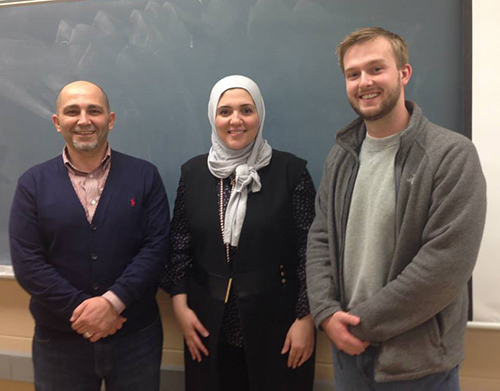
Abdrabboh stands with assistant professor Ihsan Alkhatib (left) and Jeremy Pruitt (right), president of the Pre-Law Student Association.
Fatina Abdrabboh’s mixed background, with a mother from Arkansas and a father from Jordan, opened her eyes to a clashing world.
As Abdrabboh, director of the American-Arab Anti-Descrimination, spoke in front of students Nov. 13, she described the misconceptions she has dealt with throughout her life, especially post 9/11.
“I do a lot of traveling and I kid about it,” she said. “ I joke about how people, when they see me on planes are clearly thinking oh I hope she doesn’t sit by me, please don’t sit my me. But some are unusually inviting and chatty and curious and I’m thinking there’s no way you think I’m that interesting.”
Those reactions, she said, were to the big elephant in the room: muslims.
“The thing that’s most disheartening is when the person that I’m next to on a plane, or next to on a train or wherever…that you know no matter what you say or where the conversation goes they want to believe in the ugliness because it’s easier,” Abdrabboh said. “Hate and ugliness is sometimes easier than working through the process of understanding.” She grew up in Dearborn, Mich., where the Arab community has created a niche for itself.
She described it as a warm place for Arabs; a town with Arabic signs, restaurants serving delicacies from the Middle-Eastern region and festivals celebrating their culture.
Abdrabboh remembered sitting in a college lecture hall as a sophomore at University of Michigan-Ann Arbor when she heard that the Twin Towers fell.
“The American in me was trying to figure out what the heck had happened and the Arab and Muslim in me certainly had to decipher what was going on,” she said.
The actions of those who planned and executed the attacks defined the Arab and Muslim generation, Abdrabboh said.
Trying to figure out what it all meant was her drive to follow her undergraduate degree from Ann Arbor with a master’s and a law degree. She also attended Harvard University and University of Pennsylvania.
The events of 9/11 called up her generation to help define what it means to be a Muslim-American during a period of ‘civil liberties erosion.’
“Now what is liberties rights erosion?” she said. “That means the curtailment or the denying of rights to people who look like me. People of the Arab or Muslim persuasion.”
Arabs and Muslims have never achieved equal status in the U.S. even before 9/11, Abdrabboh said.
She said it’s not that they lost equality after the towers fell, but that equality was lowered more than before.
But that event was only a snapshot of a much bigger Arab and Muslim culture.
Abdrabboh gave an example to explain how 9/11 reflected upon her culture:
Say for instance The News came in and took a photo of one person in the lecture waving their fist, and printed the photo with the headline “Student attends Muslim-Arab power rally.” Readers would get the wrong impression of what the lecture was actually about from that one photo.
Abdrabboh said it is her job to fight stereotypes and mischaracterizations such as that.
Actively seeking information and not limiting education to the classroom is the best way students can combat misconceptions on their own, Abdrabboh said.
Story by Amanda Grau, News Editor


























































































